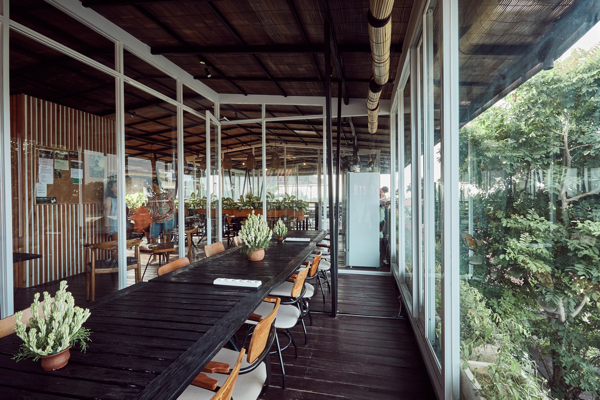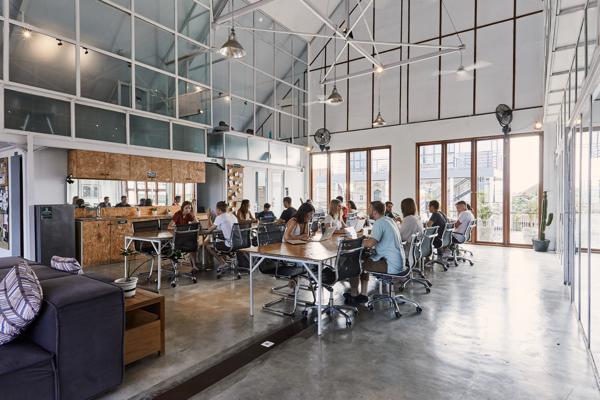So many developers and brand builders are creating concepts for digital nomads and the emerging mobile workforce with tricked-out work desks and strategically placed power outlets. But for Singapore-based Outpost, the draw and the marketing message is about the ability to connect and expand professional networks, and to keep reconnecting at other Outposts as the brand first expands in Asia. “We find people are traveling for who is here, not what is here,” said David Abraham, co-founder of Outpost along with fellow nomad Bryan Stewart.
“These remote workers are part of a greater value shift,” Abraham explained. “They’re breaking new ground as they experiment with a life that is not dominated by industrial-era work hours and work weeks, but instead is built around flexible ways of working together, living together and exploring the world.”

Outpost provides a combination of hard services – coliving rooms, coworking spaces and travel logistics, alongside soft experiences – community, events and adventure. The concept is asset-light with Abraham and Stewart looking for underused/underperforming spaces in destination locations that fit the Outpost brand. It typically converts existing assets, but Abraham adds they have begun engaging in greenfield projects. “We work with the owners to revive, activate and install coliving, coworking and F&B,” he added. “This mix, along with events and trips, helps us to monetize as much area of our properties as feasible.”
“The real differentiation for us is focusing on who’s coming to us and why, and delivering that communal-type experience,” Abraham said. “It’s about who they’re going to meet, and how they’re going to live… There’s just an enthusiasm when you’re outside your own country and want to meet, mix and learn from other folks. We try to infuse our brand with that kind of promise.”
So far, the Outpost portfolio only consists of four leased properties in Asia (Sri Lanka, three in Bali, Indonesia) with 81 keys, 337 coworking desks and more than 12,000 members since the company was more informally founded in 2016 when the duo saw an opportunity to bring together like-minded digital nomads more interested in connections than 500-thread count bed sheets. The pandemic certainly slowed growth, but now that all four properties are showing strong results and Abraham said he has more demand than beds, the potential to add as many as 10 Outposts in Indonesia, Sri Lanka and Thailand within the next year or so seems increasingly realistic.

Occupancies are now running in the 90s and ADR has room to grow, according to Abraham, who has worked from the White House to Wall Street, the plains of northern Uganda to the arctic cold of Lithuania, running NGOs, advising investors and writing a book. “The main thrust of our target audience has not yet begun to travel again,” he added. “We’re seeing a new wave of people who haven’t traveled before coming out… We know people trust that they can get their work done with us, and it creates really strong brand resonance… It’s more akin to a summer camp and how people bond with each other.”
Abraham further explained that Outpost gives its users permission to engage with one another. “When you check into a property, people are asking, ‘Hey, is there anyone here working on web 3.0 or SEO,” he said. “I would never check into a Sheraton and ask if there is someone here who is in the mining industry… We’re trying to give guests the permission to just walk up to someone in our spaces and ask ‘what are you working on?’ And for a generation that’s not used to it – it’s empowering.”
Outpost is upmarket from a hostel or other funky brands that cater to the more youthful band of wanderers. Its guests tend to skew a bit older (25 to 42) and are generally higher spending, which happily leaves room for further revenue growth and potentially a move further upmarket.

Rooms tend to trade for about US$40 a night and increases to US$45 to US$50 when you add F&B and programming revenue. There are some suites that will trade around US$130 and long-term stays are sold for about US$1,100 a month in Ubud, Bali, or Sri Lanka. Next up is a membership model, again driven by the ability to connect with fellow Outpost travelers as opposed to collecting points.
ADR is really affected by length of stay and Abraham said Outpost might sacrifice slightly on ADR for occupancy’s sake. In fact, pre-COVID, monthly rentals were Outpost’s bread and butter.
Choose your partners well
The challenge for Outpost, according to Abraham, is finding the right real estate partners. But, he adds, young Asian hotel owners worried about their future, especially business hotel owners and those catering to Chinese guests, are showing increasing interest in his alternative platform that Abraham expects will have a sweet spot of around 80 to 100 rooms.
“We come in and say, ‘Listen, the world has changed and we have demand for this new type of traveler, and the conversations really start to flow from there,” Abraham said, adding that Outpost monetizes differently and does not require the biggest room sizes. “What we really need is some flexible space, especially in the lobby, or nearby, that we can convert into communal workspace and F&B. Those types of properties lend well to what we do.”
So far, properties range from 20 to 30 rooms and the group has friends and family seed money, as well as an equity fund, mostly to develop its tech platform and grow the team as opposed to acquiring real estate. For example, in Sri Lanka, Outpost works with Nilanka Martinus at Mosvold Properties and its sub-brand We Escape. “We have signed an agreement together in Sri Lanka to develop several properties and are eager to be a part of that country’s re-emergence. Mosvold provides support in the complex operating environment of Sri Lanka,” Abraham said.
Further opportunities exist in Bali, bigger key count deals are cooking in Bangkok and Abraham sees some unique opportunities for management because of the way the brand monetizes properties with locals coming in to work and spending on F&B and other career-related amenities.
About 75% of people that use Outpost workspaces don’t book rooms and are higher spenders on F&B and amenities like Skype rooms and sound booths. “We become more of a community center where people are coming in and out,” Abraham added.

Most of the demand to date has been driven by word of mouth and Outpost is realizing some stickiness via its website. “People come to our site and look at six, seven, eight pages when the average is two,” Abraham said. “People want to learn more about us and the brand promise.”
Abraham said he is also very excited about the potential of B2B demand and Outpost has partnered with KPMG to see how it can work alongside corporations to offer a product that allows their employees another way to live and work. For example, Indonesia unicorn Gojek is already using Outpost facilities in Bali to attract talent from overseas. “We still need to add more inventory to be effective in the space, but that is what really excites us today,” Abraham added.
Outpost is also in expansion conversations with a few other property partners in Asia and has received queries coming out of Central America. However, until it grows its team and further establishes its position in Asia, considering Latin markets is not quite in the cards.
“The potential is global and we’re already speaking to people outside of outside of Asia,” Abraham said. “But we have to make sure we have the right team ready to expand.”
The key to success, based on Abraham’s experience to date: Pick your countries well and develop strong relationships with your real estate partners.
“In Asia, you have to prove it in each location,” he added. “But the conversations, I’ll tell you, are a lot easier in 2022 than they were in 2019.”

